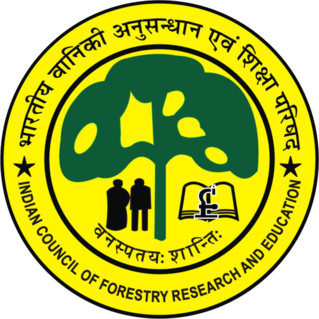Related Research Articles

Environmental laws are laws that protect the environment. Environmental law is the collection of laws, regulations, agreements and common law that governs how humans interact with their environment. This includes environmental regulations; laws governing management of natural resources, such as forests, minerals, or fisheries; and related topics such as environmental impact assessments. Environmental law is seen as the body of laws concerned with the protection of living things from the harm that human activity may immediately or eventually cause to them or their species, either directly or to the media and the habits on which they depend.
The Forestry Commission is a non-ministerial government department responsible for the management of publicly owned forests and the regulation of both public and private forestry in England.
The All India Services (AIS) comprises three Civil Services of India common to the centre and state governments, which includes the Indian Administrative Service (IAS), the Indian Police Service (IPS), and the Indian Forest Service (IFS). Civil servants recruited through All India Services by the central government are assigned to different state government cadres. Some civil servants may, later in their career, also serve the centre on deputation. Officers of these three services comply to the All India Services Rules relating to pay, conduct, leave, various allowances etc.
The Indian Forest Service (IFS) is the premier forest service of India. It was constituted in the year 1966 under the All India Services Act, 1951.

The Indian Council of Forestry Research and Education (ICFRE) is an autonomous organisation or governmental agency under the MoEFCC, Government of India. Headquartered in Dehradun, its functions are to conduct forestry research; transfer the technologies developed to the states of India and other user agencies; and to impart forestry education. The council has 9 research institutes and 4 advanced centres to cater to the research needs of different bio-geographical regions. These are located at Dehradun, Shimla, Ranchi, Jorhat, Jabalpur, Jodhpur, Bengaluru, Coimbatore, Prayagraj, Chhindwara, Aizawl, Hyderabad and Agartala.

The Ministry of Environment, Forest and Climate Change (MoEFCC) is an Indian government ministry. The ministry portfolio is currently held by Bhupender Yadav, Union Minister of Environment, Forest and Climate Change.

A "Common Important Forest" in India is a forest governed by local communities in a way compatible with sustainable development. Such forests are typically called village forests or panchayat forests, reflecting the fact that the administration and resource use of the forest occurs at the village and panchayat levels. Hamlets, villages and communities of villages may actually administer such a forest. Such community forests are usually administered by a locally elected body, usually called the Forest Protection Committee, Village Forest Committee or the Village Forest Institution. Such committees are known as Van Panchayats in the Kumaon Division of Uttarakhand, Forest Co-operative Societies in Himachal Pradesh and Van Samrakshan Samitis in Andhra Pradesh. Legislation pertaining to communal forests vary from state to state, but typically the state government retains some administrative control over matters like staff appointment, and penalization of offenders. Such forests typically conform to the IUCN Category VI Protected Areas, but protection may be enforced by the local communities or the government depending on local legislation. Maharashtra is the state with the most forest land while Haryana has the least.
Environment policies of the Government of India includes legislations related to environment.

Forestry in India is a significant rural industry and a major environmental resource. India is one of the ten most forest-rich countries of the world. Together, India and 9 other countries account for 67 percent of the total forest area of the world. India's forest cover grew at 0.20% annually over 1990–2000, and has grown at the rate of 0.7% per year over 2000–2010, after decades where forest degradation was a matter of serious concern.

The National Tiger Conservation Authority (NTCA) was established in India in December 2005, following a recommendation of the Tiger Task Force. The Prime Minister of India established it to reorganise the management of Project Tiger and many Tiger Reserves in India.

The environment of India comprises some of the world's most biodiverse ecozones. The Deccan Traps, Gangetic Plains and the Himalayas are the major geographical features. The country faces different forms of pollution as its major environmental issue and is more vulnerable to the effects of climate change being a developing nation. India has laws protecting the environment and is one of the countries that signed the Convention on Biological Diversity (CBD) treaty. The Ministry of Environment, Forest and Climate Change and each particular state forest departments plan and implement environmental policies throughout the country.

The Ministry of Mines is the ministry in the Government of India. The ministry functions as the primary body for the formulation and administration of laws relating to mines in India. The head of the ministry is Pralhad Joshi, who has been serving since June 2019.
The Law Commission of India is an executive body established by an order of the Government of India. The commission's function is to research and advise the government on legal reform, and is composed of legal experts, and headed by a retired judge. The commission is established for a fixed tenure and works as an advisory body to the Ministry of Law and Justice.

Bhupinder Nath Kirpal was the 31st Chief Justice of India, serving from 6 May 2002 until his retirement on 7 November 2002.
Central Secretariat Service is the administrative civil service under Group A and Group B of the Central Civil Services of the executive branch of the Government of India. They are governed by Central Secretariat Service Rules of 1962, which has been issued under the powers of Article 309 of the Constitution of India. The service members work under restrictions and rules of Central Civil Services (Conduct) Rules.

Conservation in India can be traced to the time of Ashoka, tracing to the Ashoka Pillar Edicts as one of the earliest conservation efforts in the world. Conservation generally refers to the act of carefully and efficiently using natural resources. Conservation efforts begun in India before 5 AD, as efforts are made to have a forest administration. The Ministry of Environment, Forest and Climate Change is the ministry responsible for implementation of environmental and forestry program in India, which include the management of national parks, conservation of flora and fauna of India, and pollution controls.
Mining scams in India refers to a series of alleged widespread scams in various ore-rich states of India, which has generated controversy. Such issues span encroachment of forest areas, underpayment of government royalties, and conflict with tribals regarding land rights. The spill-over of the effects of legal mining into issues such as Naxalism and the distortion of the Indian political system by mixed politics and mining interests, has gained international attention.

The Department of Environment and Forests is one of the departments of Government of Tamil Nadu. The department was created in 1995 and is responsible for environmental management and forests in the state.

The Western Ghats Ecology Expert Panel (WGEEP), also known as the Gadgil Commission after its chairman Madhav Gadgil, was an environmental research commission appointed by the Ministry of Environment and Forests of India. The commission submitted the report to the Government of India on 31 August 2011. The Expert Panel approached the project through a set of tasks, such as:
- Compilation of readily available information about Western Ghats
- Development of Geo-spatial database based on environmental sensitivity, and
- Consultation with Government bodies and Civil society groups.
References
- ↑ "NATIONAL FOREST COMMISSION SET UP JUSTICE B.N. KIRPAL TO HEAD THE FIRST EVER COMMISSION", Ministry of Environment & Forests, Govt. of India, 21st February 2003. Last accessed 21 November 2021
- 1 2 "National Forest Commission Report, Chapters 1–8" (PDF). Ministry of Environment & Forests, Government of India. 2006. Archived from the original (PDF) on 19 November 2011.
- ↑ National Forest Commission Public Notice Western Ghats biodiversity information system - Centre for Ecological Sciences.